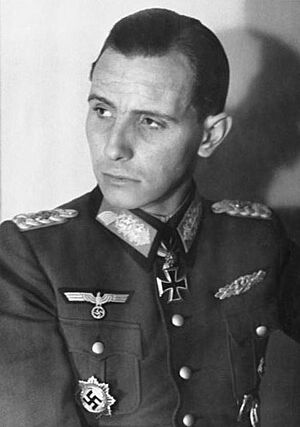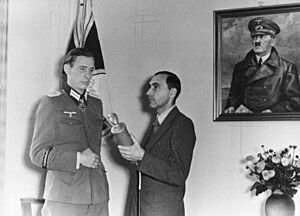Otto Ernst Remer facts for kids
Quick facts for kids
Otto Ernst Remer
|
|
|---|---|

Remer in 1945
|
|
| Born | 18 August 1912 |
| Died | 4 October 1997 (aged 85) |
| Known for | Foiling 20 July plot Founding Socialist Reich Party Holocaust denial |
| Criminal status | Deceased |
| Conviction(s) | Incitement of racial hatred |
| Criminal penalty | 22 months imprisonment |
| Military career | |
| Allegiance | |
| Service/ |
Wehrmacht |
| Rank | Generalmajor |
| Commands held | Infantry Regiment Großdeutschland |
| Battles/wars | World War II |
| Awards | Knight's Cross of the Iron Cross with Oak Leaves |
Otto Ernst Remer (born August 18, 1912 – died October 4, 1997) was a German army officer during World War II. He became well-known for stopping a plan to overthrow Adolf Hitler in 1944. After the war, he became a politician and a far-right activist. He helped start a political group called the Socialist Reich Party in West Germany in the 1950s. He is seen as an important figure in neo-fascist politics in Germany after the war.
Contents
Early Life and Military Start
Otto Ernst Remer was born in Neubrandenburg, Germany, on August 18, 1912. He went to a military school and became an officer in the German Army in 1932. This was just a few months before Adolf Hitler became the leader of Germany.
Military Career in World War II
Remer started his army career in April 1933. He was an ensign in the 4th Prussian Infantry Regiment. He took part in several major events of World War II. These included the Invasion of Poland in 1939, the Balkans Campaign, and Operation Barbarossa. In April 1942, he joined the Infantry Regiment Großdeutschland.
In February 1943, he led a battalion in the Großdeutschland Division. His troops helped protect a tank unit during the Third Battle of Kharkov. He received the Knight's Cross of the Iron Cross for his leadership. In November 1943, he was given the Oak Leaves to the Knight's Cross. Adolf Hitler himself presented him with this award.
Stopping the 20 July 1944 Plot
In March 1944, Remer became the leader of the Wachbataillon Großdeutschland. On July 20, 1944, some army officers tried to overthrow Adolf Hitler. They tried to kill him with a bomb at his headquarters in East Prussia. Remer was in Berlin at the time. He heard about the plot from members of the Nazi Party. He waited for official news about Hitler.
On the evening of July 20, 1944, Claus von Stauffenberg returned to Berlin. He was the officer who had placed the bomb. Believing Hitler was dead, Stauffenberg ordered Remer to arrest several high-ranking Nazi officials. He claimed these officials were part of a coup. Remer was told to arrest Joseph Goebbels, a top Nazi official.
When Remer arrived at Goebbels' office, Goebbels told him that Hitler was still alive. Goebbels said Hitler had given new orders. Remer asked for proof. Goebbels then called Hitler at his headquarters. He handed the phone to Remer. Remer heard Hitler's voice. Hitler ordered him to stop the plot in Berlin. Remer then realized he had been taking orders from the plotters. He returned with his troops to the Berlin Military Headquarters. There, he arrested the plotters, including Stauffenberg.
Friedrich Fromm, a high-ranking general, had the plotters quickly put to death. Remer had been told to keep the plotters alive if possible. That same night, Remer was promoted to Colonel. He was promoted to General in early 1945.
Remer commanded a special unit called the Führerbegleitbrigade for the rest of the war. He fought in East Prussia and during the Battle of the Bulge. The United States Army captured him near the end of the war. He was a prisoner until 1947.
Life After the War
Political Activities
After being released, Remer became involved in politics in West Germany. In 1950, he started a political group called the Socialist Reich Party. This party was banned in 1952 because it made very strong and sometimes hateful political statements. Before it was banned, the party gained many supporters. It won seats in local parliaments in Lower Saxony and Schleswig-Holstein. The party also won seats in the Parliament of the Free Hanseatic City of Bremen.
The Socialist Reich Party spread untrue claims about the war and its events. They also said that the new West German government was controlled by other countries. They believed West Germany should oppose this control.
Exile from Germany
After his party was banned, Remer faced legal trouble in West Germany. He was accused of trying to restart a neo-Nazi political movement. An arrest warrant was issued for him. He went into hiding and then fled to Egypt. In Egypt, he worked as an advisor to Gamal Abdel Nasser. He also helped other Germans assist Arab countries with their armed forces.
Remer later claimed to have met Yasser Arafat, a Palestinian leader. He said he helped arrange business deals between German companies and the PLO. However, he denied arranging weapons shipments.
Later Life and Death
Helmut Friebe, a former general, spoke about Remer. He said that Remer's actions on July 20, 1944, had serious consequences. Friebe felt that Remer should have lived a quiet life afterward.
Remer died in Marbella, Spain, on October 4, 1997. He was 85 years old. His ashes were buried in a secret location in Germany.
Awards and Honors
- Iron Cross (1939) 2nd Class (May 20, 1940) & 1st Class (June 12, 1940)
- German Cross in Gold on August 29, 1942
- Close Combat Clasp in Silver
- Wound Badge in Silver
- Knight's Cross of the Iron Cross with Oak Leaves
- Knight's Cross on May 18, 1943
- 325th Oak Leaves on November 12, 1943
Images for kids
 | Victor J. Glover |
 | Yvonne Cagle |
 | Jeanette Epps |
 | Bernard A. Harris Jr. |



